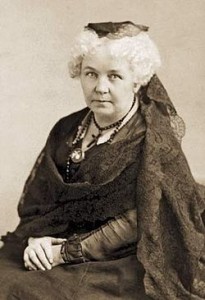The 19th century brought a revolution in the understanding of women’s nature and role in society. Throughout the century, two ways of thinking about women were in tension with each other. One way of thinking saw women as human, and focused on the full citizenship that women ought to share with men. The other way of thinking saw women as female, and focused on the special gifts that women brought to their traditional roles as wives and mothers.
In this ferment (and clash) of ideas, the word ‘feminism’ was born (so we should be aware that this ‘new’ word is not a mid-20th century creation, but was coined a century before we were born). Here’s one definition of a feminist: “A person who is in favor of, and who promotes, the equality of women with men, a person who advocates and practices treating women primarily as human persons (as men are so treated) and willingly contravenes social customs in so acting.” (Leonard Swidler in ‘Jesus Was a Feminist’)


